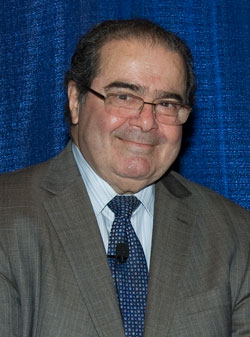Scalia calls Voting Rights Act 'racial preferment,' says Thomas led him to the right

File photo of U.S. Supreme Court Justice Antonin
Scalia courtesy of ABA Media Services.
Justice Antonin Scalia told law students on Monday evening that the Voting Rights Act is now an “embedded” form of “racial preferment.”
Speaking at the University of California Washington Center, Scalia said the law was initially passed as an emergency response to racial discrimination, according to the Wall Street Journal (sub. req.) and its Law Blog (both sub. req.). But now the law amounts to racial entitlement because the federal government doesn’t take a similar interest in protecting the voting rights of whites, he said.
Scalia made similar comments during February oral arguments in a challenge to the law.
Scalia pointed out that the state where he lives, Virginia, elected a black governor who served from 1990 to 1994, yet it is required to obtain preclearance for voting changes under Section 5 of the law. Most states that are exempt from the advance clearance requirement have not elected blacks as governors, he said.
Scalia criticized Supreme Court precedents that expanded the number of protected minority groups, according to the Law Blog account. There are “all sorts of minorities,” he said, but minority status alone should not insulate people from majority policy choices.
Scalia then gave an example, the Law Blog says. Child abusers are a minority, Scalia said, but they should not receive special protection.
One student asked if it was true that Justice Clarence Thomas had led Scalia to the right after joining the court in 1991, instead of Scalia leading Thomas. “Yes, it is true,” Scalia said. The news media, he said, had portrayed the situation in a different light, suggesting Thomas was a Scalia pawn in an effort to get the new justice to moderate his views.
Scalia also addressed originalism and gay relationships. “I don’t consider homosexuality a new phenomenon,” he said. It was considered a crime in most places when the 14th Amendment guaranteeing equal protection was ratified in 1868, he said.
The Wall Street Journal’s Law Blog covers Scalia’s comments on administrative law in a separate post that says the justice “hinted” he will vote against the Federal Communications Commission in a pending case.



